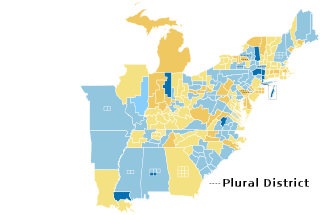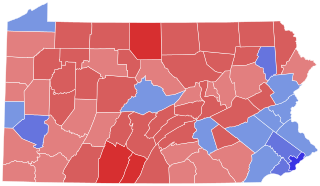| Elections in Pennsylvania |
|---|
 |
Of the 28 Pennsylvania incumbents, 24 were re-elected.
| District | Incumbent | Party | First elected | Result | Candidates |
|---|---|---|---|---|---|
| Pennsylvania 1 | William A. Barrett | Democratic | 1948 | Incumbent re-elected. | √ William A. Barrett (Democratic) 66.1% Gus A. Pedicone (Republican) 33.2% Nancy Streve (Socialist Workers) 0.7% |
| Pennsylvania 2 | Robert N. C. Nix Sr. | Democratic | 1958 | Incumbent re-elected. | √ Robert N. C. Nix Sr. (Democratic) 70.1% Frederick D. Bryant (Republican) 29.9% |
| Pennsylvania 3 | William J. Green III Redistricted from the 5th district | Democratic | 1964 | Incumbent re-elected. | √ William J. Green III (Democratic) 63.3% Alfred Marroletti (Republican) 36.2% Anthony Monteiro (C) 0.5% |
| James A. Byrne | Democratic | 1952 | Incumbent lost renomination. Democratic loss. | ||
| Pennsylvania 4 | Joshua Eilberg | Democratic | 1966 | Incumbent re-elected. | √ Joshua Eilberg (Democratic) 55.9% William Pfender (Republican) 44.1% |
| Pennsylvania 5 | John H. Ware III Redistricted from the 9th district | Republican | 1970 | Incumbent re-elected. | √ John H. Ware III (Republican) 64.7% Brower Yerger (Democratic) 35.3% |
| Pennsylvania 6 | Gus Yatron | Democratic | 1968 | Incumbent re-elected. | √ Gus Yatron (Democratic) 64.5% Eugene W. Hubler (Republican) 34.6% Frank E. Huet (Const) 1.0% |
| Pennsylvania 7 | Lawrence G. Williams | Republican | 1966 | Incumbent re-elected. | √ Lawrence G. Williams (Republican) 60.6% Stuart S. Bowie (Democratic) 39.4% |
| Pennsylvania 8 | Edward G. Biester Jr. | Republican | 1966 | Incumbent re-elected. | √ Edward G. Biester Jr. (Republican) 64.4% Alan Williams (Democratic) 35.6% |
| Pennsylvania 9 | None (district created) | New seat. New member elected. Republican gain. | √ Bud Shuster (Republican) 61.8% Earl P. Collins (Democratic) 38.2% | ||
| Pennsylvania 10 | Joseph M. McDade | Republican | 1962 | Incumbent re-elected. | √ Joseph M. McDade (Republican) 73.6% Stanley R. Coveleskie (Democratic) 26.4% |
| Pennsylvania 11 | Daniel J. Flood | Democratic | 1954 | Incumbent re-elected. | √ Daniel J. Flood (Democratic) 68.3% Donald B. Ayers (Republican) 31.7% |
| Pennsylvania 12 | John P. Saylor Redistricted from the 22nd district | Republican | 1949 | Incumbent re-elected. | √ John P. Saylor (Republican) 68.1% Joseph Murphy (Democratic) 31.9% |
| J. Irving Whalley | Republican | 1960 | Incumbent retired. Republican loss. | ||
| Pennsylvania 13 | R. Lawrence Coughlin | Republican | 1968 | Incumbent re-elected. | √ R. Lawrence Coughlin (Republican) 66.6% Katherine L. Camp (Democratic) 33.4% |
| Pennsylvania 14 | William S. Moorhead | Democratic | 1958 | Incumbent re-elected. | √ William S. Moorhead (Democratic) 59.3% Roland S. Catarinella (Republican) 40.4% Ronald N. Henderson (C) 0.3% |
| Pennsylvania 15 | Fred B. Rooney | Democratic | 1963 | Incumbent re-elected. | √ Fred B. Rooney (Democratic) 60.8% Wardell F. Steigerwalt (Republican) 39.2% |
| Pennsylvania 16 | Edwin D. Eshleman | Republican | 1966 | Incumbent re-elected. | √ Edwin D. Eshleman (Republican) 73.5% Shirley S. Garrett (Democratic) 26.5% |
| Pennsylvania 17 | Herman T. Schneebeli | Republican | 1960 | Incumbent re-elected. | √ Herman T. Schneebeli (Republican) 72.2% Donald J. Rippon (Democratic) 26.6% Andrew J. Watson (Const) 1.2% |
| Pennsylvania 18 | H. John Heinz III | Republican | 1971 | Incumbent re-elected. | √ H. John Heinz III (Republican) 72.8% Douglas Walgren (Democratic) 27.2% |
| Pennsylvania 19 | George Atlee Goodling | Republican | 1966 | Incumbent re-elected. | √ George Atlee Goodling (Republican) 57.5% Richard P. Noll (Democratic) 41.2% Paul H. Leese (Const) 1.2% |
| Pennsylvania 20 | Joseph M. Gaydos | Democratic | 1968 | Incumbent re-elected. | √ Joseph M. Gaydos (Democratic) 61.5% William Hunt (Republican) 38.5% |
| Pennsylvania 21 | John H. Dent | Democratic | 1958 | Incumbent re-elected. | √ John H. Dent (Democratic) 62.0% Thomas H. Young (Republican) 38.0% |
| Pennsylvania 22 | Thomas E. Morgan Redistricted from the 26th district | Democratic | 1944 | Incumbent re-elected. | √ Thomas E. Morgan (Democratic) 60.8% James R. Montgomery (Republican) 39.2% |
| William Sheldrick Conover Redistricted from the 27th district | Republican | 1972 (Special) | Incumbent lost renomination. Republican loss. | ||
| Pennsylvania 23 | Albert W. Johnson | Republican | 1963 | Incumbent re-elected. | √ Albert W. Johnson (Republican) 56.5% Ernest A. Kassab (Democratic) 43.5% |
| Pennsylvania 24 | Joseph P. Vigorito | Democratic | 1964 | Incumbent re-elected. | √ Joseph P. Vigorito (Democratic) 68.8% Alvin W. Levenhagen (Republican) 31.2% |
| Pennsylvania 25 | Frank M. Clark | Democratic | 1954 | Incumbent re-elected. | √ Frank M. Clark (Democratic) 55.8% Gary A. Myers (Republican) 44.2% |










